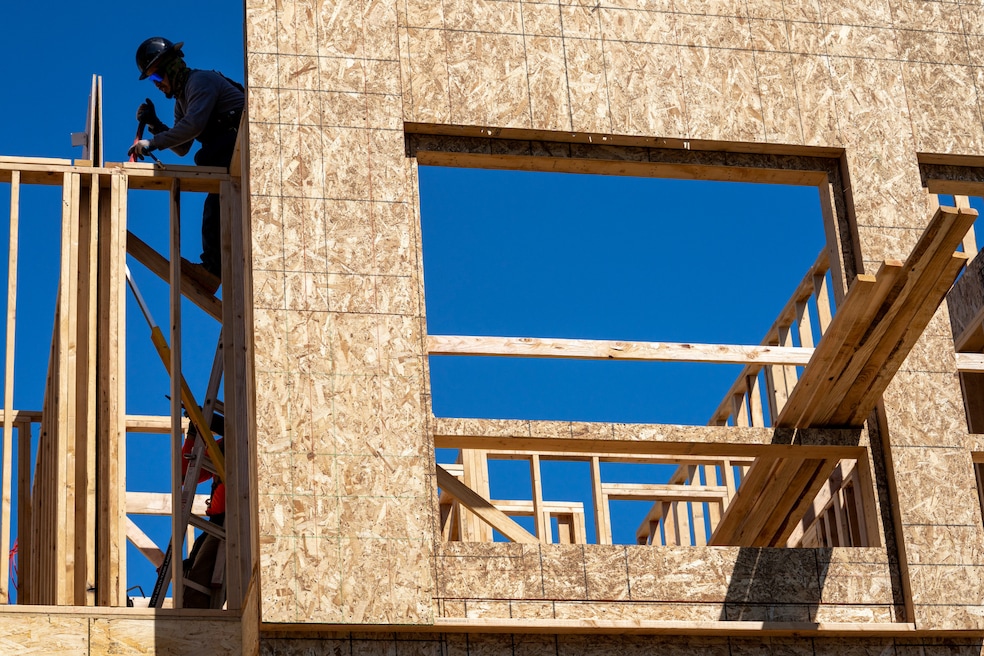Homebuilder industry leaders are meeting weekly with the White House in support of the Trump administration's nationwide push for new construction, James Tobin, president and CEO of the National Association of Home Builders told Homes.com in an exclusive interview Friday.
As part of his effort to remove barriers to home construction, Trump is considering an executive order to increase housing supply by using incentives or requirements that encourage local governments to allow more land to be developed more quickly, Tobin said.
“We're in communication with the administration and the White House weekly on a variety of different issues" related to housing, Tobin said. There’s no set timeline for when the executive order will be issued. However, Tobin said, “We’re optimistic that [it will be issued] sometime before the end of the year, but there’s a lot of balls in the air right now when it comes to housing.”
In October, the Trump administration unveiled a plan to “restore the American Dream,” urging the nation’s largest builders to ramp up construction as the market faces an affordability crisis. In a post on Truth Social, Trump accused the largest homebuilders of hoarding land, comparing them to OPEC's past efforts to keep prices high.
Tobin said the executive order under consideration is just one of several federal initiatives aimed at increasing housing construction. Another effort involves the Federal Housing Finance Agency, which wants to remove Fannie Mae and Freddie Mac from federal conservatorship, possibly by the end of this year.
“Housing is having its moment,” Tobin said. “More importantly, it seems it doesn’t matter [who] you are in government, local, state, or national... the solution to the affordability crisis in this country is to build more homes. And that’s all three levels of government working together with home builders to build more homes so that we can lower the price of housing by adding more supply.”
The FHFA did not immediately respond to a request to comment. The White House declined to comment.
Future of Fannie and Freddie shapes ongoing policy discussions
President Trump and FHFA Director Bill Pulte have publicly urged the mortgage giants to help the nation’s largest homebuilders ramp up production.
Tobin said reforms to Freddie and Fannie would make it easier for builders to finance new homes and increase supply.
He is advocating for the mortgage giants to expand beyond supporting homebuyers and help finance new construction by buying and packaging builder loans. This, Tobin said, would boost liquidity in the construction loan market by freeing up capital to make more loans. That would lower borrowing costs for builders and ultimately enable more homebuilding.
“We believe that Fannie and Freddie could play a role in the supply side equation, not just demand side,” Tobin said. “If Fannie and Freddie were to be able to create a program where [construction loans] could get rolled off, that would lower those lending rates, and make that market more liquid, which means you could build more housing.”
Pulte said on social media in early October that Fannie and Freddie “will be asking relevant market participants to disclose big builder loans they are selling to” the government-sponsored enterprises in a bid to “continue, and to strengthen, the safety and soundness of the market.”
Fannie Mae already helps some people obtain loans that cover both the construction of a new home and the conversion of that loan into a regular mortgage once the house is completed.
The two entities buy mortgages from banks and other lenders, then bundle those loans into mortgage-backed securities that can be sold to investors. However, since the 2008 financial crisis, both entities have remained under federal conservatorship.
In a post earlier this month on X, Pulte of the Federal Housing Finance Agency said the Trump administration is “opportunistically evaluating” a public offering for the two mortgage giants.
“President Trump made the right decision not to take Freddie and Fannie public during his first term and is opportunistically evaluating an offering this time around, which could be as early as the end of 2025,” Pulte wrote.
“I believe that Fannie and Freddie should be privatized, but the guarantee has to be there,” Tobin said. “I think that is what makes Fannie and Freddie important. That’s why they were created with this federal guarantee.”
Tobin added that if Fannie and Freddie were to be fully privatized, the cost of capital and mortgage rates could eventually rise because the federal guarantee would need to be priced in.
Construction stalls due to government shutdown
The government shutdown continues to have a significant impact on the real estate industry, creating ripple effects for all stakeholders.
Earlier this month, the Maryland Association of Realtors said a monthlong shutdown could cost the state up to $70 million in delayed or canceled residential deals. Real estate agents, owners and landlords said residential and leasing activity had slowed across Maryland, Virginia and Washington, D.C. Buyers and renters, they said, felt uneasy about economic prospects and job security as the Trump administration threatened to hold back any backpay when the government resumes.
More layoffs and economic struggles are expected for the local workforce. On Friday, the Federal Reserve announced it would cut approximately 150 jobs from its supervision and regulatory departments, according to the Wall Street Journal.
The government shutdown and economic uncertainties have halted many real estate projects nationwide, Tobin said. He said anything dependent on federal financial support — from construction, insurance to mortgages — has to wait to move forward since application reviews are on pause since the first week of October.
“For people working with federal financing, it’s a challenge,” Tobin said. “There are definitely downstream effects when it comes to the government shutdown on housing.”

